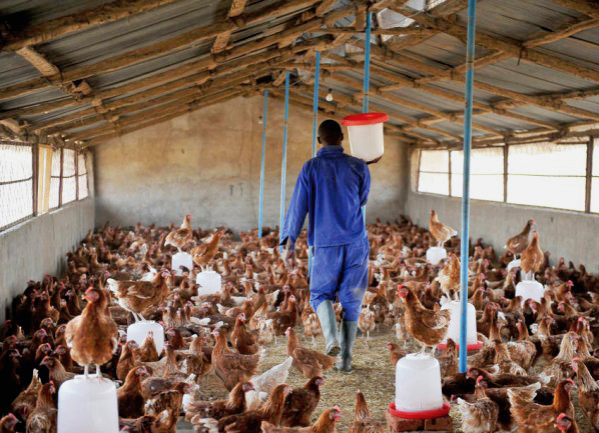About twenty (20) poultry farmers under the government’s “Rearing for Food and Jobs (RFJ) ” in Lower Manya Krobo Municipality of the Eastern region are crying over huge losses incurred due to substandard poultry birds and feed supplied them.
The farmers working under the broiler module of the program explained that the initial agreement between MOFA and farmers was to off-take all live birds from the farm at six( 6) weeks of maturity, however, for reasons unknown to the farmers the first batch of birds were given to them at 10 weeks.
“At Lower Manya, the birds were picked between 10 to 13 weeks at the peak of the feed crisis. This affected the weight of birds and other serious implications ensued. The health of birds was affected seriously and started dying. Farmers began losing birds after Six weeks. Some losing over 800 birds”
The farmers maintained that MoFA’s failure to honor a promise to supply the feed for some time led to feeding crises which affected the growth of the birds. They alleged that the few feeds supplied were also substandard.
They stated that the decision by the state to buy a kilo of the chicken at Ghc7.20p worsened their situation creating huge losses.
Some of the farmers said they took huge loans from Banks to invest in the business, therefore, being pursued to repay with interest.
The farmers are demanding a renegotiation between farmers and MOFA to address issues on the failed agreement.” These issues that resulted from MOFA failing their part of the agreement must be addressed immediately: extra feeding cost, medication, labor, utility, and lost birds after 6 weeks”.
Below is the Petition to the Ministry of Food and Agriculture-RFJ- Broiler module-
We the poultry farmers of the Lower Manya who participated in the rearing for food and jobs (broiler module) hereby present our grievances and issues with the program which need urgent attention.
The following were our observations and issues about the project:
Having received the birds the following concerns have been raised by various farmers;
The breed promised was COBB 500 but farmers believe the breed was different due to their poor performance.
Their feed conversion ratio was very poor in the first 2 weeks. We suspect the breed was mixed with the inferior lower breed. This must be investigated and resolved with the supplier
We believe the cost of day-old could be lower than GH3 because a kilo was bought at GH7.2 at maturity.
The birds arrived in a very bad condition, most of them very weak and this has consequences on their general health and performance.
Access, cost, and quality of feed
We were promised by the coordinators of this project that there was an arrangement with a feed company to give farmers constant supply but after the first two weeks supply the feed was being rationed (a farmer would be given 3 bags of feed to feed 2000 birds for a week) and by the fourth week, farmers had to look for their feed as no feed could be accessed from the MOFA office from Akuse. This affected the growth of the birds, extra labor, and an increase in budget.
There was a significant price hike of feed.
The feed price communicated to farmers at the beginning of the programs was GH108 per 50 kilos but even the subsidized feed was sold to farmers at GH112 and subsequently, broiler feed was sold between GH130 to 150 per 50kilo and this excludes transportation of Gh3 to Gh5 per bag.
Quality of feed
The feed supplied for farmers for the first two weeks was of low quality; the texture was bad for day-olds (had bigger shells and maize. There is picture evidence of this.
Extra duration after “6 weeks”
The agreement between MOFA and farmers was to off-take all live birds from the farm at 6 weeks of maturity. This did not happen at all. The first batch of birds was picked at 10 weeks (giving farmers extra cost and stress). And at Lower Manya, the birds were picked between 10 to 13 weeks at the peak of the feed crisis. This affected the weight of birds and other serious implications ensued. The health of birds was affected seriously and started dying. Farmers began losing birds after Six weeks. Some losing over 800 birds. The big question we are asking MOFA is: who bears the cost of the feeding, labor, utility, and the cost of the lost birds after the six weeks?
Buying a kilo of live birds at GH7.2 is woefully inadequate to offset the huge cost incurred. This obviously should be a great concern to the coordinators and MOFA but that is not what we are seeing now.
Supervision and support from MOFA:
We had little supervision and support from the coordinators; at the peak of the feed crisis, every burden was left on the farmers. It was obvious that Mr. Isaac Nyumuteye had little or no answers to our questions, concerns, and struggles even though he did his best to explain why he could not help. When birds were sick and dying, there was no concern from MOFA, but we knew this was a partnership and MOFA was to offer support to farmers as expected of them.
Records of lost birds and extra expenditure It is very sad and disappointing to note that, after almost a month since the birds were picked from the farm, No one from MOFA had asked for records of lost birds from the farmers. The coordinators do not know how many birds were lost after 6 weeks and other important records of expenditure.
Lack of proper communication
There was limited communication to farmers on the deliverables of the program. It was obvious that our Lower Manya coordinator had no answers to when birds were going to be picked and many others. It took reporting the issues to the regional office and the media before some responses were given for certain concerns.
Our demands
We the farmers are asking for the following demand to be met immediately;
Renegotiation between farmers and MOFA to address issues on the failed agreement which seriously affected farmers. These issues that resulted from MOFA failing their part of the agreement must be addressed immediately: extra feeding cost, medication, labor, utility, and lost birds after 6 weeks.
We demand an emergency meeting between farmers and MOFA coordinators to seek the audience of issues and concerns of farmers to reduce their anxiety and emotional stress
Failure to act on this petition with urgency or any form of reluctance to address our issues as observed during the program may lead to farmers seeking other forms of redress
Conclusion
Farmers have lost their capital and are emotionally stressed, some have fallen sick and going through a lot of difficulties; the monies realized from the sales of birds cannot even pay for the day-olds cost and their first two weeks feeding. Our creditors are chasing us for their money and we need help to resolve this.
This is a serious issue that needs urgent attention but unfortunately, it`s not been seen as such.
Thank you
Source: Mybrytfmonline.com/Obed Ansah




















































